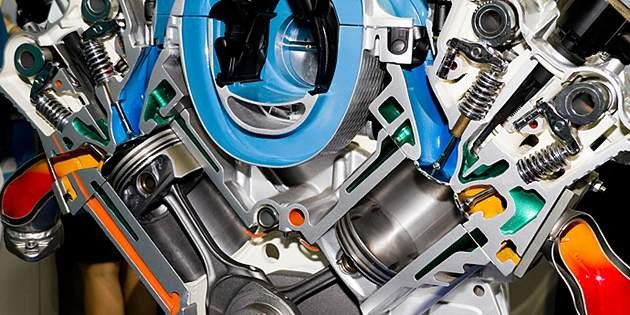Optimizing Engine Efficiency and Performance
Article

DuPont collaborates with automakers to help optimze engine efficiency.
Downsizing for Improved Engine Efficiency
Downsizing gas and diesel engines with technologies that boost performance or improve efficiency is a primary way in which the industry lowers emissions and improves fuel economy without compromising performance. These technologies range from turbo chargers that boost power, to direct injection multi-speed automatic transmissions.
The Science Behind Consumer Perception
DuPont is focusing on how materials and science can reduce friction and optimize the mass-to-efficiency ratio. We’re developing lightweight materials that can stand up to heat, chemicals and pressures so the auto industry can hit mass reduction goals. DuPont experts are working on ways to recapture and re-use CO2 and reduce rolling resistance. There is a tremendous amount of science and engineering that goes into improved engine efficiency and fuel savings, while helping to maintain comfort, performance and total system cost.
Technologies for Customer Satisfaction and a Cleaner World
When it comes to optimizing engine efficiency, the challenges facing the auto industry are significant — more than 65% of energy loss occurs within the engine. DuPont is focused on developing technologies and materials that help automakers downsize engines while improving fuel economy and maintaining performance. We’re currently working on technologies ranging from turbo chargers to boost power, to direct injection and multi-speed automatic transmissions. We’re developing heat-, pressure-, and chemical-resistant plastics, elastomers and composites to help the industry add lighter weight power-boost technologies to smaller, more efficient engines.
DuPont engine efficiency-improving materials are helping the industry hit mass reduction goals, recapture and re-use exhaust gases, and reduce rolling resistance. Consumers want cars that deliver fuel savings without any sacrifice in comfort or performance, and without any increase in cost. DuPont scientists are working with auto engineers every day to deliver against the exacting demands of today’s market.
Turbocharging Engine Efficiency
DuPont engine efficiency experts are currently working with the auto industry to create turbocharging technology and materials for use in mainstream vehicle production, where the application requirements are rigorous, to say the least. We’re developing materials that resist:
- High temperatures
- Higher acidity of exhaust gas recirculation (EGR)
- High pressures
- Chemically aggressive coolants
DuPont™ PLUS Nylon Resin
The family of high-performance nylon and PPA materials delivers long-term resistance to heat, chemicals and pressure. Unlike specialty nylon resins, PLUS retains the processing ease typical of traditional nylon resins. This family is targeted primarily at automotive underhood and engine applications.
DuPont™ HTN High Performance Polyamide
Cost-effective DuPont™ HTN bridges the performance gap between conventional engineering resins and high-end specialty polymers, balancing chemical, moisture and temperature resistance, while delivering outstanding processability.
DuPont™ Vespel® Parts and Shapes
Ball-bearing retainers fabricated from DuPont™ Vespel® parts and shapes can improve turbocharger response times through low weight and inertia. Vespel® waste gate bushings achieve required sealing without the usual wear and abrasion of the shaft. These days, DuPont™ Nomex® fiber is helping OEMs negotiate new challenges, including the increased power density requirements and harsh operating conditions of the motors and generators used in (H)EVs.
More DuPont Engine Efficiency Solutions
See how DuPont™ PLUS can be used to keep weight off components that improve engine efficiency.
At DuPont we’re about using science to transform challenges into innovation. Here are some of the initiatives we’re working on with our auto industry collaborators.